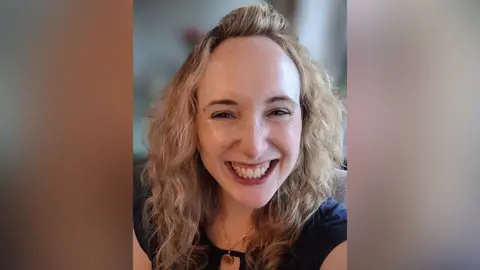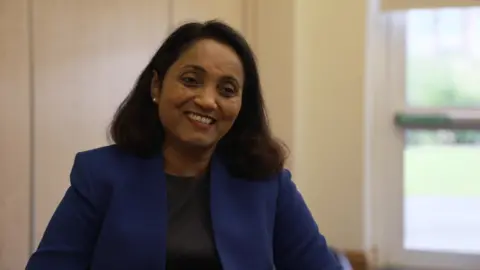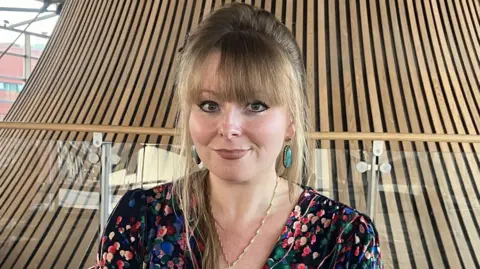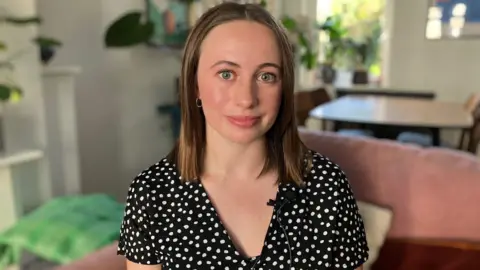ARTICLE AD BOX
Cardiff endometriosis patient wants condition treated more urgently
Lara Stevens says endometriosis is like the cancer she had as a child, with the potential to spread and damage multiple organs – but feels it is not treated with the required urgency.
"The endometriosis could be growing and I wouldn’t know where it is and what it's going to do next," said the 36-year-old, who had non-Hodgkin lymphoma aged seven.
Gynaecology waiting lists in Wales have increased by 92% in the past four years, yet specialists feel it is seen as less urgent than other surgeries.
The Royal College of Obstetricians and Gynaecologists is calling for long-term investment in women's health, and the Welsh government said it is a key priority and a women's health plan is due this year.
What is endometriosis?
Endometriosis is a gynaecological condition associated with menstruation where tissue similar to the lining of the womb is found in other areas of the body, including the fallopian tubes, pelvis, bowel, vagina and intestines.
In rare cases it has even been found in the lungs, eyes, spine and brain. It was once thought that the only place in the body where endometriosis did not occur was the spleen, but in 2020 it was found there also.
Symptoms include severe to debilitating pain often in the pelvic area, fatigue, and heavy periods, and the condition is also associated with infertility.

 Lara Stevens
Lara Stevens
"I hate to think if I had waited, what could have happened," says Lara Stevens
Lara said she had been trying to become pregnant for four years, but after a number of miscarriages and additional waits for fertility support, she opted to use her health insurance to have surgery privately.
"I was saddened that it wasn't being seen as a priority, because when I did have my surgery I was riddled with it (endometriosis)," she said.
"It was all around the back of my bladder, my bowel, it was sitting under both my ovaries, and I hate to think if I had waited, what could have happened."
The university lecturer, who lives near Cardiff, said she was led to believe at the time there were four or five year waits for surgery.
"I was in my early 30s at that point and didn’t want to be in my late 30s still trying, but also thinking about the damage the endometriosis was doing to my organs.
"No woman knows when their periods are going to end, so you’re stuck between a rock and a hard place."
Lara fell pregnant soon after surgery to remove endometriosis, and has recently had a second baby.
But she said a lesion remains on her bowel and she is likely to need further surgery.
She is now under the care of NHS gynaecology services, where waits for routine follow-up appointments can also be lengthy.
There are currently more than 50,000 women in Wales waiting for hospital gynaecological services, with nearly half waiting longer than the target of 26 weeks, and more than a third waiting longer than 36 weeks.
"I understand personally why cancer is important," she said.
"What I'm saying is maybe this should be seen as just as important, because it's a condition that can be unpredictable, could get worse, and needs to be monitored.
"To be constantly feeling like you’re fighting to get that help, makes it harder."
Recent NHS performance figures show four other specialties with waiting lists longer than gynaecology.
However, when you take into consideration only those who are eligible for gynaecology, per head of population gynae services are on a par with the worst waits in Wales, and worse than England or Scotland.
Geeta Kumar, vice-president for clinical quality at the Royal College of Obstetricians and Gynaecology, as well as clinical lead for women's services in north Wales, said there were multiple reasons for growing waiting lists.
"Women’s awareness of conditions has increased – which is for the good, but we also feel that women's health has been de-prioritised for a long period," she said.


Geeta Kumar says during Covid one of the most rapidly cancelled lists for treatment was gynaecology
She said there has been a concerted effort to move away from describing conditions like pelvic pain, prolapse and endometriosis as "benign gynaecological conditions" and instead use the term "non-cancerous".
"Benign gives the perception that it is not urgent, so when it comes to elective planned lists, compared to other surgical specialties, gynaecology often got de-prioritised," she added.
The phrase is also viewed by many patients as minimising or trivialising symptoms which Dr Kumar described as “extremely debilitating”.
"Women are reporting not just physical harm, but also their mental wellbeing being affected, even some are not able to leave home because of the condition, whether it's pain or bleeding they’re suffering from."


Delyth Jewell MS says many women feel pain is normalised and it takes longer for symptoms to be taken seriously
Plaid Cymru Member of the Senedd (MS) Delyth Jewell, who sits on the cross-party group on women's health in the Senedd, said the delays to see a specialist were compounded when many women felt they have had their symptoms dismissed and battled to be referred.
"Women are too often not believed or told that they have to put up with pain," she said.
"They go years with chronic pain - being gaslit, being told that maybe they just are suffering with anxiety, or it’s all in their head."
In July 2022 the Welsh government published a quality statement on women's health, acknowledging "significant disparities in care between men and women".
Goals were put in place to publish a 10-year women's health plan this year - similar strategies were published in England in 2022 and Scotland in 2021, but Ms Jewell said she was disappointed Wales was waiting longer.


Liz Williams says there are wider societal attitudes that women's pain is inevitable
Liz Williams, vice-chair of the patient-led charity Fair Treatment for the Women of Wales (FTWW) said some members had felt forced to leave their jobs, had relationships break down as a result of symptoms, or had fallen into debt as they felt they had no choice but to pay for private care.
She added: "We don't believe women can equitably access services - they are being let down."

 7 months ago
32
7 months ago
32








 English (US) ·
English (US) ·